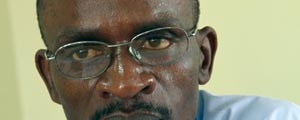
The dust has settled and climate change negotiators are on their way back to their respective countries.
Wisdom Mdzungairi
Zimbabwe’s representatives may also be on their way minus Environment, Water and Climate minister Saviour Kasukuwere who did not attend the talks to enjoy his new found fame as chief campaigner of the ruling Zanu PF party.
In the past two weeks, business, politics, social and scientists the world over were brought together to come up with an agreeable position on mitigating and adapting to global warming.
I could not get Kasukuwere to explain the Zimbabwe position at the United Nations Framework Convention on Climate Change (Unfccc).
But the fact that the majority of Zimbabweans earn a living through farming could mean that the country should get serious about dealing with effects of climate change — whether we like it or not.
Climate change is perhaps the most serious environmental threat to the fight against hunger, malnutrition, disease and poverty in Africa, mainly through its impact on agricultural productivity — yet it appears that negotiators at the just ended UNFCCC have declared that there was “no justice” in the outcome of COP20.
It appears Africa and other poor continents went to the climate change talks to agree on a roadmap to Paris next year.
- Chamisa under fire over US$120K donation
- Mavhunga puts DeMbare into Chibuku quarterfinals
- Pension funds bet on Cabora Bassa oilfields
- Councils defy govt fire tender directive
Keep Reading
Unfortunately, they left having roughly drawn lines in the shifting sands of the Peruvian coastal plains. We must not lose sight that COP 20’s main aim was to agree to provide detailed information about commitments countries would make before Paris to enable others to dissect these pledges.
And yes, it was achieved, and a draft of elements of the Paris agreement was agreed to.
Even then there were still major issues of dispute, and these have been deferred until Paris next year.
The intractable issue of the division or differentiation between developing and developed countries and how much each should do couldn’t be unresolved.
This binary division was central to the UNFCCC struck in 1992, but was this year not relevant as countries now range along a spectrum of economic development.
Yet this division ran through most aspects of the Lima agreement and so fundamental is this division to some developing countries including Zimbabwe’s view of world affairs that it cannot easily be exercised.
This is why it is important for Zimbabwe to be fully represented at the top and spell out their position. Their absence only save to worsen things for the people.
After two weeks of negotiations, a last minute text was agreed, but it did nothing to address pre-2020 climate action, sidelined the issue of dealing with the impacts of climate change, and hardly progressed the rules for a new agreement that is supposed to be signed in Paris next year was agreed.
A statement by social movements in the South said: “What we have seen in Lima is another in a series of yearly decisions that weaken international climate rules, failing people and the planet.”
After all has been said and done, it appears the outcomes of Lima have shown that the world wants to bury its head in the sand.
Make no mistake, science shows that the failure to revisit our 2020 targets is sure to set the world on track for 4C of warming and risk many more storms this year.
Has Lima failed the people of the world? Will Paris look at the urgency of the crisis or its agreement will not be worth the paper it is written on?
Africa and the poorest people require more than empty political statements that contain lots of the right sounding words, but very little in actual concrete commitments.
It is time a solution is found and next year in Paris, a global climate agreement simply has to happen.
After all it is already too late. Agriculture has been particularly affected and as we have seen in Harare and many other urban dwellings, there are already implications for access to clean drinking water and edible food.
The poorest people and women are suffering the most. Drought, famine and soil corrosion are increasing all the time, and about 2,2 million Zimbabweans are yearning for food aid across the country.
Reports are that the planet’s ability to adjust to changing temperatures has been seriously affected. Hence, we need to ask ourselves whose standards of living are to blame for climate change and who is suffering the consequences.
According to COP 20 briefings, between 1970-2012, two million people died because of climate change. That’s why the developing countries are calling for climate justice.
Europe must adjust their goals and be more ambitious. They too need a complete shift to renewable energy and must increase funding to tackle climate change.
Zimbabwe must, therefore, take advantage of the green funds floating around by coming up with a solid programme to benefit rural folks.
In the interim, South Africa has been the major beneficiary of almost all green funding. What is Zimbabwe doing as government? A well-structured, balanced and coherent policy will do the trick for the country. The private sector should also come in handy and assist going forward, but they need to be co-ordinated.
Governments must also take the lead on building frameworks and to co-operate with a broad range of actors in fighting global warming. This is not a time for tinkering, it is a time for transformation — a complete transformation.
No doubt that investments in addressing climate change will propel gains in our broader development goals.
Conversely, investments made in the development of the country whether through ZimAsset or whatever means must be aligned with Zimbabwe’s climate aims.











